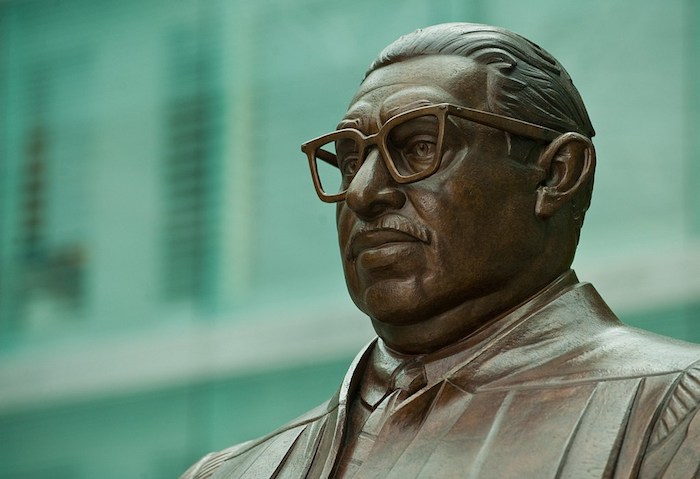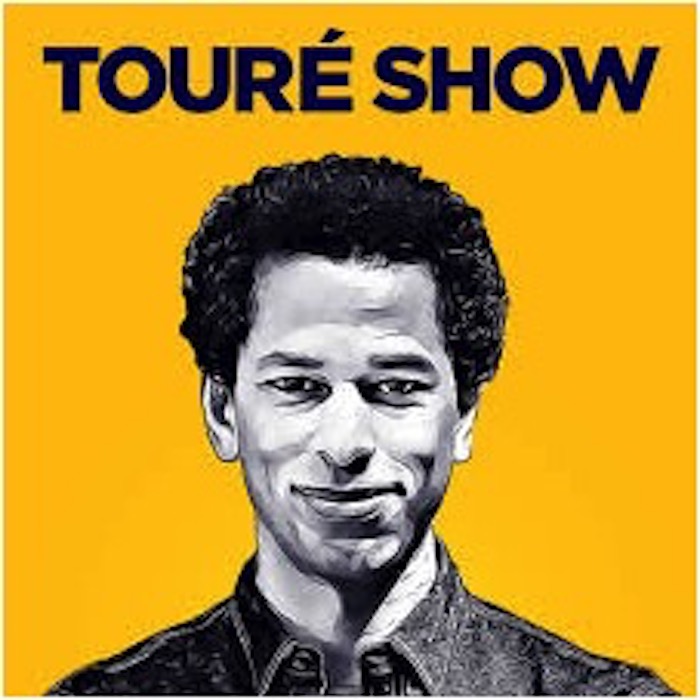Bill Moyers is a great journalist. So proud to have this article about my film on his site!
BY TITI YU
Before he was a Supreme Court justice, Thurgood Marshall was a civil rights lawyer battling the same forces that confront our justice system today.
After garnering eight NAACP Image Award nominations and a Grammy nomination for best song, Marshall, an independent film you may have missed earlier this year, is back in theaters this week. It tells the story of a little-known 1941 court case involving a black chauffeur, Joseph Spell (played by Sterling K. Brown), who is accused of raping his white wealthy employer, Eleanor Strubing (Kate Hudson). The NAACP assigns a young Thurgood Marshall (Chadwick Boseman) to take the case.
Boseman plays Marshall as a brash and cocky young attorney entertainingly, but what makes this film worth seeing is the case. It may not have the historical weight of Brown v. Board of Education, but it is relevant in the modern age of Black Lives Matter and Kalief Browder, who spent three years in Rikers Island Prison despite never being convicted of a crime.
From the beginning, Spell faced an impossible situation in the criminal justice system — one faced by countless others including the Scottsboro boys, Emmett Till and the Central Park Five. Spell had an inexperienced defense lawyer, a bigoted prosecutor, a judge with questionable objectivity and lived in a society deeply prejudiced about white women associating with black men. Throughout the trial, he was pressured to take a plea deal despite his innocence. Were it not for Marshall’s insistence on going to trial, the case would have ended in obscurity and Spell would have been another nameless victim in prison.
What Spell faced in 1941 still rings true today. More than 90 percent of all criminal cases never go to trial. Black and Latino defendants are more likely to be offered plea bargains that include incarceration, contributing to the stunning racial imbalance in the penal system. A new study published this year by Carlos Berdejo of Loyola Law School found that prosecutors overwhelmingly gave white defendants better deals in misdemeanor charges. Berdejo analyzed over 30,000 thousand cases in Wisconsin over seven years, and found that whites were 74 percent more likely than blacks and Latinos to get a deal that dropped or reduced their charges. Countless African-American defendants still face similar experiences upon enter the justice system. Luckily, Spell had Thurgood Marshall in his corner.
We talked with the film’s director, Reginald Hudlin. This interview has been edited for length and clarity.
Titi Yu: Why did you decide to focus on The State of Connecticut v. Joseph Spell?
Reginald Hudlin: Because we hadn’t seen it. For it to work as a movie, it had to be a case where we don’t know the outcome. Hopefully you learned about Brown v. Board of Education in the fifth grade or sometime. So I was excited to tell a story that was sort of an original story. I also really loved the Connecticut setting, because Northern racism too often gets a pass, and Joseph Spell himself, because he’s no angel as they say. It made the story very relevant and relatable to current cases — you know, whenever they shoot some innocent kid. Many times, people are on trial for what’s said about them in the media. But what about the case? Did they do what you’re accusing them of? I thought, for all those reasons, it was the right story.
TY: What was it about this case that showed that Thurgood Marshall would become the kind of lawyer and litigator we know him as now?
RH: Well, the case works on a lot of different levels. First of all, it’s a very messy case. It’s rape and attempted murder. And so inherently we feel protective of the woman. And that’s the reason I wanted Kate Hudson. Because who doesn’t love Kate Hudson? This woman was attacked, and it’s horrible — there’s that natural gut instinct. Then there is the fact that Thurgood Marshall was gagged. [The judge allowed Marshall to assist Spell’s attorney in arguing the case but he was not allowed to speak in the courtroom.] Metaphorically, that speaks to the whole thing. This guy, he was fighting for freedom, and they literally took his voice away. This is the equivalent of telling Muhammad Ali, “We are going to put you in the ring and tie your hands behind your back and see if you can win the fight.” So, under the most impossible circumstances, we see Thurgood run a trial without speaking. We see his detective skills and his ability to read people, whether it’s the audience or whether it’s whoever was testifying.
TY: There are a lot of similarities between this case and what many African-Americans still face in the justice system. In the scene where Joseph Spell was considering whether or not he was going to take a plea, it reminded me so much of the Kalief Browder case, where there was enormous pressure to take a plea even when he was innocent of the crime.
RH: Absolutely. There are so many systemic problems that undermine our justice system. The plea bargain process is absolutely one of them where people are constantly under tremendous pressure to cop a plea, which sometimes means admitting to a crime you didn’t commit. Because the system is so overloaded they just want to move on for the sake of efficiency. This happens three times in the film. The third time is the most important one, because, relatively speaking, in plea-bargain terms, it is a good deal and Thurgood Marshall is not there. So both Sam Friedman (Spell’s attorney) and Joseph Spell have to do the right thing. And they both kind of passed the test. They represent us, right? Because we don’t have Thurgood Marshall here, and it is on all of us to do the right thing when called.
TY: Sam Friedman’s role was just as important in the film as that of Thurgood Marshall. He came to believe in the case because in his own life he was experiencing the anti-Semitism of prewar Connecticut’s wealthy society.
RH: So many people who watch it go, “Ri-i-i-ght!” That was all happening at the same time. We are used to compartmentalizing American racism and global anti-Semitism. But the fact is, this was all part of a worldwide movement for white supremacy. World War II was the only war explicitly fought over the idea of white supremacy. And it is very easy for us to get caught up in our own problems and challenges. It’s important to step back and say, “Wait a minute, all these movements are connected. We’re all fighting the same opponent.” So we would be more efficient if we linked arms and fought them together.
In the case of Sam Friedman, one of the reasons why black Americans have been the leaders in the fight against racism is because assimilation is not an option. You know Sam Friedman can say, “I’m basically white and I guess I’ll take the little slights and hope that if I work hard enough maybe I’ll get accepted into the club. Or maybe I’ll start my own club.” But assimilation is much more of an option for him than it is for black Americans. For black folks, we have no choice. We’ve got to break this wall down. That has always put black Americans in the leadership position of these fights for equality for all.
TY: Tell me about the scene with Langston Hughes. Why was that scene important to you?
RH: That’s one of the most important scenes in the film. A lot of people say they don’t get that scene, because so often the struggles for equality are presented with characters who have their backs against the wall; they have no choice. Thurgood Marshall had a choice. He was a college-educated attorney. He could choose to live a comfortable life. He could stay in Harlem during the Harlem Renaissance; it was a utopian place to hang out with his college buddies Cab Calloway and Langston Hughes. Instead Marshall leaves that, gets on a train and literally goes to hell. He goes to these towns that would lynch him if he’s there after sundown. He says, I know you don’t think I’m human, and you don’t think my clan is human, but I’m going to change your mind. That’s an extraordinary action. And again, that goes back to who we are. We all live lives of relative comfort. How much are we willing to be uncomfortable and go fight to make change?
Comment
+ Permalink

By Justin Tucker
The Constitution of the United States of America is without a doubt a milestone in the development of liberal thought, but it is far from perfect and has failed to actually limit the power of the federal government. It is taken for granted, although it was not always intended to protect anyone who was not a white male.
Thurgood Marshall, as played terrifically by Chadwick Boseman in the historical courtroom drama Marshall, made it his mission to reclaim the letter of the law to protect people who were historically excluded from exercising their constitutional rights. The film takes place 1941 and tells the story of Connecticut v. Joseph Spell. As the only lawyer for an NAACP in need of donations, he is tasked with representing Spell (Emmy winner Sterling K. Brown, The People v. OJ Simpson: American Crime Story), a black chauffeur accused of raping Eleanor Strubing (Kate Hudson), the wife in a prominent local family, and throwing her into a Greenwich, Connecticut river.
He is reluctantly joined by local insurance lawyer Sam Friedman (the amiable Josh Gad), who wishes to remain out of the limelight and away from a racially-charged case that could impact his family and law practice. The determined and aggressive Marshall kicks him into gear, reminding him what is at stake, forcing him to think about injustices happening at the time at home and in Europe on the eve of the United States’ entry into the second Word War.
In the courtroom they are met with a prejudiced judge (a belligerent James Cromwell) who questions the usefulness of having an out-of-state lawyer represent the defendant, but to make the trial appear to be fair, he allows Marshall to stay as long as he does not speak in court under the threat of being held in contempt. Marshall and Friedman, faced with a major uphill battle, must expose the prejudice and secrets that exist just under the surface in Greenwich to prove the innocence of their client.
Director Reginald Hudlin (House Party, Boomerang) returns to the director’s chair after a fourteen-year absence and brings us a crowd pleasing and inspiring history lesson about the man who would go on to be the first African American Supreme Court justice. The script, by Jacob Koskoff and Michael Koskoff, unfolds the story in a well-flowing manner and they develop interesting characters that audiences can care about. The tone, despite its subject matter, is rather light and optimistic. Bosemen delivers another outstanding turn as a major American icon after performances as Jackie Robinson in 42 and James Brown in Get On Up, respectively. He and his co-star Gad work well off each other, with Gad providing much of the humor.
While Thurgood Marshall was by no means a libertarian, we can still respect his fight against the institutional racism in the North and the South, and his devotion to providing justice under the law. The film forces us to recognize that rights haven’t always been upheld by the state and must be defended. In this regard, Marshall has a lot to offer libertarian audiences.
* Justin Tucker is a writer and Libertarian activist living in Chicago, Illinois. He is a Staff Writer for URChicago.com and is the Chair of the Libertarian Party of Chicago.
Comment
+ Permalink


